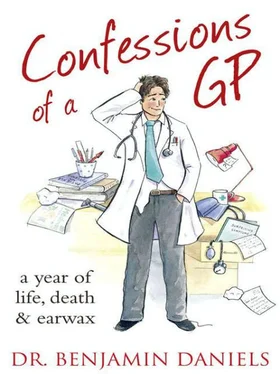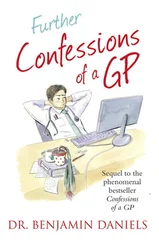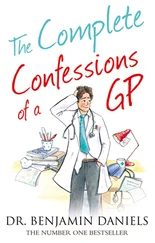Our oddest patient was called Tommy. I’m not quite sure what his diagnosis was but he was on the ward because of his sexual disinhibition. He had never raped or sexually assaulted anyone but he used to expose himself a lot and masturbate in public. Tommy was fairly quiet on the ward and the other patients had learnt to tolerate his odd behaviours. They would quite happily sit in the TV room trying to guess the Countdown conundrum while Tommy would be sitting quietly in the corner wanking himself off over Carol Vorderman.
Tommy’s behaviours seemed to be getting better with some help from the psychologist and we thought things were going well until the incident with the pat dog. A pat dog is usually a very docile oldish dog that occasionally gets brought round nursing homes and hospital wards. The idea is that spending some time with a friendly dog can make people feel a little better for a bit, maybe even help bring them out of their depression and anxiety. Everyone loves a big cuddly docile dog that likes being stroked.
Trigger was just this type of dog. He was a ten-year-old Labrador who just adored being given attention. His owner was retired and enjoyed bringing him around to the hospital. While Trigger was being petted by the patients, Ted his owner would have a cup of tea and a chat with the nurses. It was a Wednesday afternoon and I was sitting in the nurses’ office writing up some notes. Trigger was in the lounge with the patients and Ted was in the office with us talking about his impending hernia operation. Suddenly, we heard barking. ‘That’s odd,’ said Ted, ‘Trigger never barks.’ We all rushed into the lounge to see a very upset-looking Trigger being chased around the room by a naked Tommy and his erect member. It shouldn’t have been funny, but it really was. We never saw Trigger or Ted again, speculating that the poor dog had posttraumatic stress disorder and had probably been retired early on health grounds.
‘How can I help today?’
‘Pain, Doctor.’
‘Where is your pain?’
‘Pain all over, Doctor.’
‘Everywhere?’
‘Yes, Doctor.’
‘Head?’
‘Yes, Doctor.’
‘Legs?’
‘Yes, Doctor.’
‘Arms, chest, back, toes, ears?’
‘Yes, Doctor. All-over body pain, Doctor.’
Rina is in her forties and from Bangladesh. She has been in England for many years but, unfortunately, she still speaks only minimal English. I’ve never seen her smile or look anything other than thoroughly miserable. She often comes in bruised and I suspect that she is hit by her husband, although she denies this. Over the years she has presented with numerous pains all over her body and we have never found a medical cause for them. We call it CHAOS, Constant Hurts All Over Syndrome.
‘Medicine to help me, Doctor? Please, thank you.’
Rina comes to the surgery most weeks presenting with some pain or another. I’ve never found a cause for the pain and suspect it is related to stress and depression. Rather than fob her off with another painkiller, today I decide to do the right thing and try to treat her holistically. I’m going to treat the whole person. Explore her health beliefs and expectations. Do the right thing.
‘So, Mrs Miah, why do you think that you have so many pains.’
‘Pains all over, Doctor.’
‘Yes, but why do you think you are having so many pains?’
Silence.
‘We have done lots of tests and they have all been normal. Some people find that when they have pains all over for a long time, it can be connected to stress. What do you think?’
Silence.
‘Is there anything else that you’d like to discuss today? Any problems at home?’
More silence.
I think Rina has understood me but she still looks at me blankly. We both sit there in an awkward silence. Me wondering why she can’t talk about her emotions; her wondering why I’m not dishing out a prescription and letting her get on her way. The way we view pain and disease is very dependent on culture and our understanding of illness and its causes. The concept of rationalising pain and physical symptoms with underlying emotional problems is something that my middle-class English patients thrive on. They love to be asked about how their overall health may be affected by their external environment. ‘Hmmm, Mrs James, you seem to have had a lot of colds recently. Why do you think that might be?’ ‘Well, perhaps I have been overdoing it a bit at work recently and I am very worried about Samuel’s school entrance exams. Maybe I should go back to working part time. What do you think, Doctor?’
I have no idea what Rina’s ideas are about her health and whether she ever contemplates any possible external cause for her all-over body pain. I’m not sure if it is a cultural barrier or a language one that I’m facing with Rina. Perhaps she does recognise that she is depressed but can’t express it to me for whatever reason. If I was working in Bradford or the East End of London, I’m sure there would be specialist services available for someone like Rina – a place with multilingual support and experts in problems faced by Bangladeshi women in the UK. Unfortunately, this town is small and mostly white. Our counsellors are excellent but I fear that they would face the same language and cultural barriers as me. I once started her on an antidepressant but despite careful explanation as to how they should be taken, she just took them once in a while when she had a pain and so, of course, they didn’t help.
Rina’s daughter is with her today and is happy to interpret for me. The problem is that, although very bright and articulate, she is only 11 and I don’t feel it is fair to use her to help translate personal questions about her mother’s mental health. Officially, we should use professional interpreters but it is hard work and time consuming. Even if I can establish that Rina has stress and depression, I probably won’t change the things that are making her depressed and it is so much easier just to give a prescription for another painkiller and wave her on her way.
Doctors do appreciate the importance of treating people holistically and recognising cultural differences but that appreciation doesn’t always help the individual patients in front of me. Sometimes I blame not being holistic on only having ten minutes per consultation, but I could have ten hours with Rina and I’m not sure whether the outcome would be any better. Yet another unsatisfactory consultation and a feeling of short-changing my patient.
Doctors are fairly immune to seeing you naked. Not much will shock or embarrass us, but if we are going to be required to delve into your nether regions, it would be immensely appreciated if you had a bit of a freshen-up first. Men, if you have a problem with your bits, give them a quick wash before coming into my surgery. I personally haven’t had a foreskin for years. I find them an oddity at the best of times. I don’t want to have to peel back yours to discover a crusty layer of knob cheese. You will see me gag. Women tend to be a lot more considerate and, if requiring a vaginal examination, will make sure all is presentable. I did hear about one woman who, while running late for the doctor, gave herself a quick spray of what she thought was a vaginal deodorant. It wasn’t until she saw a puzzled-looking doctor remove a very sparkly-looking speculum from inside her that she realised she had doused herself with glitter spray by mistake
Don’t ask me how I am. That’s my question. We both know that you are here to talk about you. I know you are being polite but one of these days I might just answer the question and spend your precious ten minutes ranting about my cat’s fungal infection and my annoyance at my neighbour’s choice of late-night music.
Читать дальше
Конец ознакомительного отрывка
Купить книгу











![Benjamin Franklin - Memoirs of Benjamin Franklin; Written by Himself. [Vol. 2 of 2]](/books/747975/benjamin-franklin-memoirs-of-benjamin-franklin-wr-thumb.webp)
![Benjamin Franklin - Memoirs of Benjamin Franklin; Written by Himself. [Vol. 1 of 2]](/books/748053/benjamin-franklin-memoirs-of-benjamin-franklin-wr-thumb.webp)